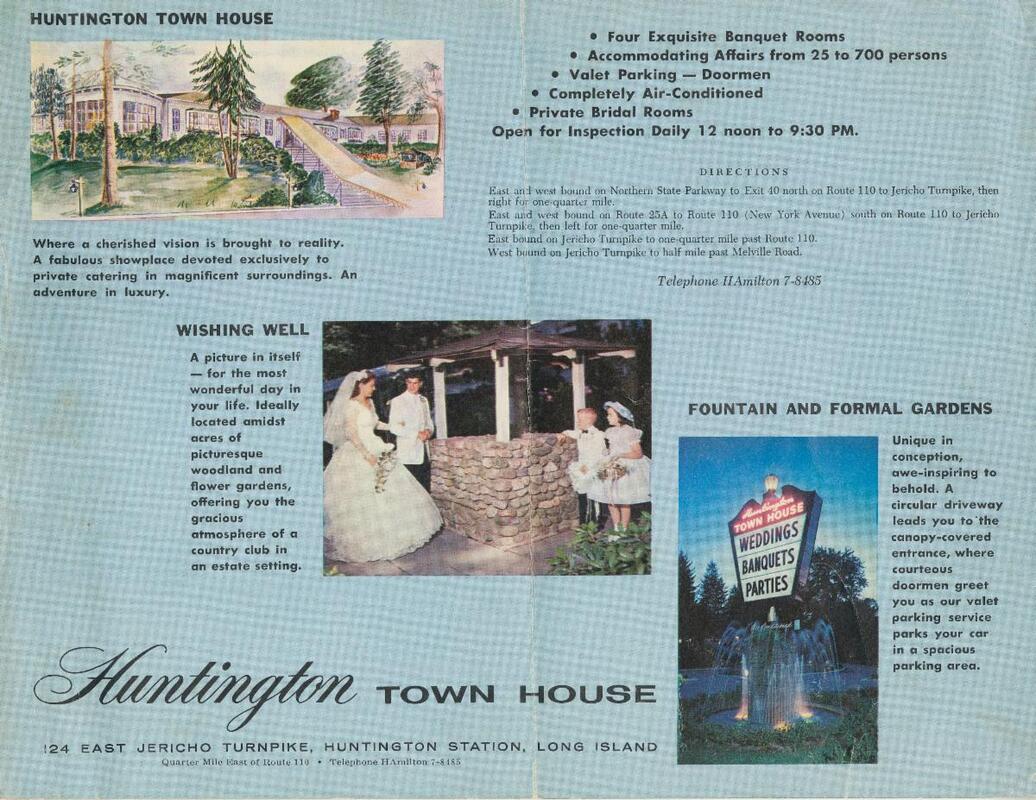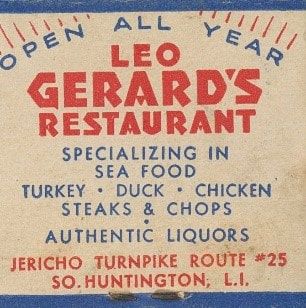By Barbara LaMonicaAssistant Archivist  For nearly 50 years, the Huntington Town House reigned as a celebrated venue for weddings, proms, bar mitzvahs, and anniversary parties. Politicians and celebrities such as the Beach Boys, Steve Levy, Hillary Clinton, and Donald Trump held events there. More importantly, the Town House engenders memories for the thousands of people whose milestone celebrations were held under its crystal chandeliers. The evolution of the Town House begins in the late nineteenth century with a restaurateur and hotelier family, the Gerards. William Gerard operated hotels in Cold Spring Harbor-the Laurelton on the west side of the harbor, and after he sold the Laurelton in 1880, he acquired the Glenda, Matchbook Covers for Gerard's a castle built in 1853 on the east side of the harbor. His son Leo, born in 1892, grew up in the hotels, and eventually followed in his father’s footsteps. Initially Leo became manager at the Huntington Yacht Club in 1927, and then in 1932 he opened Gerard’s Restaurant on 25A in Cold Spring Harbor (later to become The Moorings Restaurant). Gerard’s Restaurant became so popular that even after expanding the building he still had to turn customers away. This prompted him to look for other locations to accommodate larger crowds. In March 1937, Leo purchased the 5-acre Bruns estate on the south side of Jericho Turnpike ½ mile east of Route 110. The estate home had a large dining room that could seat over 100 people in addition to several bedrooms. Leo Gerard added a dance floor, a taproom, and a cocktail lounge.  In 1957, Gerard, ready to retire after a solidly successful run, sold the property to Thomas Manno, who in anticipation of the coming baby boom generation, turned it into a strictly catering business and christened it the Huntington Town House. Manno expanded banquet facilities to 11 rooms. Multiple kitchens equipped with machines could turn out 5,000 meatballs in one hour, and high-pressure mashed potato hoses could gush out 2,000 potato rosettes in a comparable amount of time. The property comprised 20 acres with parking spaces for 2,000 cars. Now renown as the only catering facility of its kind, the Town House attracted customers from all over the Island as well as Queens, Manhattan, the Bronx, and Westchester. Manno had plans to build a conference center with lodgings on the property, but after he passed away, his widow sold the Town House to Rhona Silver in 1997 for 7.6 million dollars. Silver was the most flamboyant and successful Town House owner. She reached icon status as the “queen of catering” presiding over a business that in addition to weddings, night after night hosted charity dinners and corporate events. It was even the site of a concert by the rapper 50 Cent. She specialized in creating spectacle and fantasy, a bride and groom arriving in the grand ballroom in a coach drawn by two white horses, or a couple landing on the lawn in a hot air balloon. She was in demand for offsite catering as well, such as catering an affair for the prime minister of Israel and being the only caterer allowed inside Mar-a-Lago. As a child, she grew up in her family’s catering business in the Bronx, and later opened a catering business in space she rented in Temple Beth El in Cedarhurst where she was known as the only Glatt Kosher caterer. Silver had plans to construct a lodging and conference center at the Town House which had preliminary approval when Manno had first proposed the idea. However, these plans never came to fruition as Silver sold the Town House to Lowes for $38.5 million in 2007. She suddenly found herself mired in several lawsuits. The real estate company sued her for commissions and her half-brother sued her claiming he owed half the Town House business. Silver then initiated her own lawsuit suing her boyfriend, Barry Newman, real estate developer, for $25.9 million claiming he forged her name on documents for the sale and ripped her off for millions leaving her destitute. Newman claims he loaned her millions over the years for the business but it really supported her lavish lifestyle. He claims the proceeds from the sale were used to pay off debtors. Who knows what really happened? Unfortunately, Silver died of a heart attack in 2017, with the law suits still unresolved. The Huntington Town House, a repository of memories for a generation, was ultimately demolished in 2011 to be replaced by Target.
0 Comments
|
AuthorThis blog has been written by various affiliates of the Huntington Historical Society. Categories
All
Archives
April 2024
|
Become a Member
Donate Today!
Signup For Our Newsletter
Thanks for signing up!
© Huntington Historical Society. All rights reserved.
The Huntington Historical Society gratefully acknowledges the Town of Huntington for its steadfast support.
The Huntington Historical Society gratefully acknowledges the Town of Huntington for its steadfast support.


 RSS Feed
RSS Feed
